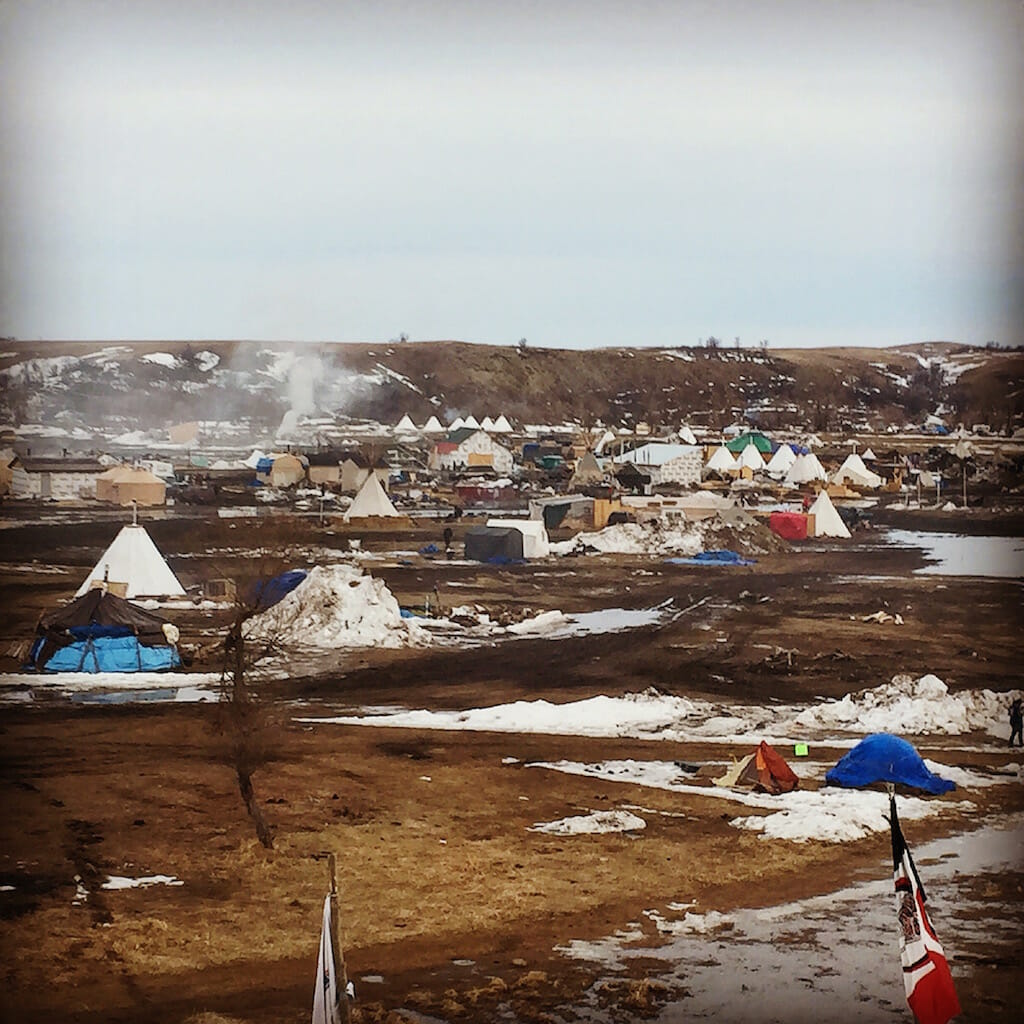This Could be the Last Stand for Activists Opposing the Dakota Access Pipeline
Hundreds of people remain at the Standing Rock camps, but Oceti Sakowin — once a vibrant center for the #NoDAPL movement — now feels like a ghost town. The Oceti Sakowin Camp, home base of the #NoDAPL movement, now feels like a ghost town. (Donald Kaufman / Truthdig)
The Oceti Sakowin Camp, home base of the #NoDAPL movement, now feels like a ghost town. (Donald Kaufman / Truthdig)
Editor’s note: The sources interviewed here wanted to remain anonymous because of pending trials and fear of police and judicial repercussions.
CANNON BALL, N.D.—Native Americans and fellow activists huddled around small fires in the Oceti Sakowin Camp on Sunday night and sang songs in a nostalgic and bittersweet gathering. These demonstrators opposing the Dakota Access pipeline, who call themselves “water protectors,” feel they are making a last stand at Oceti Sakowin.
Nightly rituals of song, speech, dance and gatherings by firelight used to involve thousands at this camp, but that number has dwindled to about 50 people — many of whom have been subjected to police violence and have spent time in jail. The national media have all but vanished. Cold winds blow through the vast, empty plains.
Altogether, hundreds of people remain at the Standing Rock camps, but Oceti Sakowin — once a vibrant center for the #NoDAPL movement — now feels like a ghost town. Police stop and check all vehicles approaching the camp. No one is allowed to bring camping gear, including sleeping bags, to the site.
Many water protectors expect a raid Wednesday in which authorities will force evacuations from the camps. Resistance is likely, and some demonstrators fear it will be brutally crushed. Asked about the predicted raid, a water protector said people feel “estranged, vulnerable, [like they’re] facing a wolves’ den. … I feel betrayed.”
During the day, water protectors work urgently to remove the makeshift homes, leftover supplies and trash from Oceti Sakowin before the police come. These people working together in muddy, cold and chaotic conditions feel anxiety and fear. Many longtime campers are plagued by coughs. One speaker around the fire said that he regularly coughs up blood and that he was told that it was caused by Rozol, a chemical used to kill rats, moles and other animals. No independent sources verified that the poison was used on activists, but The Bismarck Tribune reported that Rozol had killed wildlife at the nearby Cannonball Ranch.
Law enforcement officers have arrived from many parts of the country. They include National Park Service rangers, who were told to bring riot gear and night vision and thermal scopes.
“The police are working as state enforcers of corporate greed and exploitation,” an activist told Truthdig. “I wish it wasn’t that way. I can’t construe it any other way. They are literally standing between the peoples of this land and the project [the pipeline] that’s going through it.”
Adding to the grim atmosphere, the FBI has launched a terrorism task force to investigate Standing Rock activists, The Guardian reported last week.
On Sunday night, the music, which helped campers bond over the months, brought smiles and laughter to the 50 people at Oceti Sakowin. A storm is coming, and no one at camp is delusional about what lies ahead. The immediate outcome of their resistance no longer drives them. Instead, they focus on a moral line they have drawn between what they believe is right and what they believe is wrong.
They accept that the United States government will vanquish the camp. But the stand of the water protectors, as described by Truthdig columnist and author Chris Hedges in his book “Wages of Rebellion,” has a greater purpose than preventing an oil pipeline from being built:
Some of the demonstrators trust that the #NoDAPL movement will lead to something important. Terrence Daniels, a technology activist who has been at Standing Rock since August, believes that the actions of the water protectors will increase awareness of the rights of Native Americans and help end destructive oil practices. Daniels said, “Your enemies fight their hardest at their last, and that’s one of the things we are seeing here.”
Watch video below of the Oceti Sakowin Camp takedown, ending months of “water protector” protests against the building of the Dakota Access oil pipeline.
Independent journalism is under threat and overshadowed by heavily funded mainstream media.
You can help level the playing field. Become a member.
Your tax-deductible contribution keeps us digging beneath the headlines to give you thought-provoking, investigative reporting and analysis that unearths what's really happening- without compromise.
Give today to support our courageous, independent journalists.








You need to be a supporter to comment.
There are currently no responses to this article.
Be the first to respond.